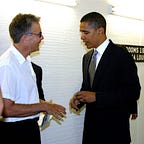GIFTS TANGIBLE AND INTANGIBLE
When I first joined the CSO, I sought out role models among the veteran musicians. I had never played in a major orchestra and I needed to learn how to fit in. One man I found myself gravitating towards was a fellow violist, Don Evans. Don had joined the orchestra in 1948. Don’s father Clarence had been Principal Viola back in the 1920s and 30s, and his wife Margie was in the cello section. Don and Margie had been childhood sweethearts and they lived in the Winnetka house where Margie had grown up.
I was drawn to Don by his combination of professionalism, calm, and a marvelous dry-as-dust sense of humor. It must be said, though, that I fell a bit short of my model from time to time. Early on, I said or did something that struck Don as a bit out of line. I can’t recall my infraction, but there is no denying that I was something of a young punk back then. Don looked at me in his serene, cool, affectionate way and told me, “You’re lucky I like you so much or else I would tell you what I think of you.”
We had one other significant bond — baseball. I was born in Detroit and am still a passionate fan of the Detroit Tigers. Don’s ties to the Chicago Cubs were at least as deep. He had grown up near Wrigley Field and spent innumerable afternoons there throughout his life. His father had taken him to the third game of the 1932 World Series, when, legend has it, Babe Ruth pointed his bat at the center field bleachers and, on the next pitch, hit his famous “called shot” home run there, an iconic moment in baseball history.
A few years later, Don attended another World Series game, another debacle for the Cubs. It was 1935, and the Cubs were up against my Detroit Tigers. It was fated to be the first Series the Tigers ever won. Don attended the third game, a typically heartbreaking Cubs loss — they succumbed in the 11th inning on an error by their third baseman. Like any real fan, Don bought a scorecard and kept score, notating how every batter fared over the course of the game. More than half a century later, shortly before leaving the orchestra, he gave this scorecard to me.
I cherish it to this day. The now 85-year-old document is a fascinating time capsule, featuring the old four-color printing technique depicting Wrigley Field at the time. There was no ivy and no left field stands, but trees lined the perimeter beyond the outfield. Several pages show photos of the players on both teams, and it is remarkable to see how much older these young athletes looked at the height of the Depression than men of the same age today. I love the notices for items like Prima Pilsner, Green River, and Edelweiss Orange Soda “For Sale in this Park”.
Most of all, I pore over Don’s penciled notations, batter by batter, right up to the 11th inning denouement. Yet as much as I treasure this relic, it is by no means the most important thing Don gave me. I may not live up to my mentor, but I strive to be as good a colleague as I can, and hope that I may in some small way offer something for my younger colleagues to emulate.
